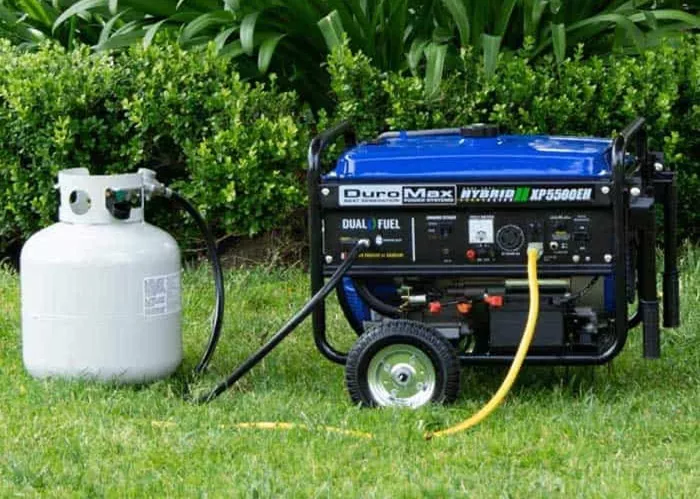Propane generators are power generators that run on propane gas as fuel. They are popular in many industries, homes, and outdoor activities where reliable electricity is needed. Propane is a clean-burning, efficient fuel, which makes propane generators an excellent choice for emergency power, backup systems, and off-grid applications.
In this article, we will explore what propane generators are, the different types, how they work, their advantages and disadvantages, tips for storage and maintenance, and how to choose the right one for your needs.
Types of Propane Generators
Portable Propane Generators
These are small, lightweight generators designed for mobility. Portable propane generators are commonly used for camping, tailgating, small job sites, or as temporary backup power at home. They usually produce between 1,000 and 7,000 watts of power.
Standby Propane Generators
Standby generators are larger units permanently installed outside a building. They connect to the home’s electrical system and propane supply. When the main power fails, they automatically turn on to provide power to the entire home or business. Standby generators typically range from 7,000 watts to over 20,000 watts.
Dual-Fuel Propane Generators
Dual-fuel models can run on both propane and gasoline. This flexibility allows users to switch fuel types depending on availability and price. Dual-fuel propane generators are popular because they increase fuel options, especially during emergencies.
Inverter Propane Generators
Inverter generators use advanced electronics to produce clean and stable power, ideal for sensitive electronics like laptops and medical devices. Inverter propane generators are often portable and quieter than conventional generators.
Working Principle of Propane Generators
Fuel Supply and Combustion
Propane gas is stored under pressure as a liquid and turns into gas when released from the tank. The propane gas is mixed with air in the carburetor or fuel injection system.
Ignition and Power Generation
The air-propane mixture is ignited inside the engine’s combustion chamber. The controlled explosion drives the pistons, which turn the engine crankshaft.
Electricity Production
The engine crankshaft rotates the generator’s alternator. The alternator converts the mechanical energy into electrical energy by spinning a rotor inside a stator coil, producing alternating current (AC).
Voltage Regulation
A voltage regulator controls the output voltage, ensuring stable electricity supply that matches the generator’s rated voltage.
Advantages of Propane Generators
Clean Burning Fuel
Propane produces fewer emissions compared to gasoline or diesel. It emits lower levels of carbon monoxide, nitrogen oxides, and particulate matter, making it better for the environment.
Longer Storage Life
Propane can be stored indefinitely in sealed tanks without degrading. Unlike gasoline, it does not evaporate or go stale, which makes propane generators more reliable after long storage.
Quiet Operation
Propane generators typically run quieter than diesel or gasoline generators due to the cleaner combustion process and engine design.
Easy to Refuel and Store
Propane tanks are easy to store and transport safely. Refueling propane generators is quick, and propane is widely available.
Lower Maintenance
Propane burns cleaner, so engines accumulate less carbon buildup. This reduces the frequency of oil changes and other engine maintenance tasks.
Disadvantages of Propane Generators
Fuel Availability
In some remote areas or during widespread emergencies, propane supply might be limited compared to gasoline or diesel.
Initial Cost
Propane generators generally cost more upfront than gasoline models, especially standby units with automatic transfer switches.
Lower Energy Density
Propane contains less energy per unit volume than gasoline or diesel, so propane generators may consume fuel faster under heavy loads.
Cold Weather Performance
At very low temperatures, propane pressure drops and fuel flow can be reduced unless special tanks or heaters are used.
Storage and Maintenance Tips
Proper Storage of Propane Tanks
- Store tanks in a well-ventilated, outdoor location away from heat sources.
- Keep tanks upright to maintain safety and proper fuel delivery.
- Inspect tanks regularly for rust, dents, or leaks.
Generator Storage
- Run the generator every month for 20-30 minutes to keep the engine lubricated.
- Drain or stabilize fuel in the system if storing for long periods.
- Cover the generator with a weatherproof cover but allow airflow.
Routine Maintenance
- Change the engine oil every 50-100 hours of operation.
- Replace air filters regularly to ensure clean combustion.
- Check spark plugs and replace if worn or fouled.
- Inspect propane lines and connections for leaks.
Winterizing Your Generator
- Use propane tanks designed for cold weather or install tank heaters.
- Keep the generator in a sheltered area to protect it from snow and ice.
- Perform a test run during cold months to ensure reliable starting.
How to Choose a Propane Generator
Assess Your Power Needs
Calculate the total wattage of appliances and devices you want to power simultaneously. Include starting watts for motors and compressors.
Decide on Portability
Choose a portable model if you need mobility for camping or job sites. For home backup, consider a standby generator.
Fuel Options
Decide if you want a dedicated propane generator or a dual-fuel model for more fuel flexibility.
Noise Levels
Check decibel ratings if noise is a concern. Inverter propane generators tend to be quieter.
Budget Considerations
Balance your initial investment with fuel cost, maintenance, and expected generator lifespan.
Brand and Warranty
Choose a reputable brand with good customer support. A solid warranty can save you money on repairs.
Safety Features
Look for features like low-oil shutdown, overload protection, and carbon monoxide sensors.
Conclusion
Propane generators offer a clean, efficient, and reliable power solution for many applications. They come in various types to suit different needs, from portable camping units to large standby systems.
Understanding how propane generators work, their benefits, and limitations will help you make informed decisions. Proper storage and maintenance ensure your generator stays ready when you need it most.
When choosing a propane generator, carefully consider your power requirements, fuel preferences, noise tolerance, and budget. Investing in the right generator will provide peace of mind and dependable power for years to come.

